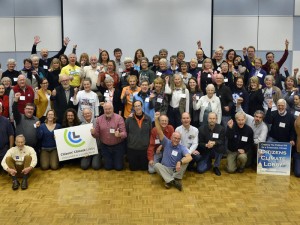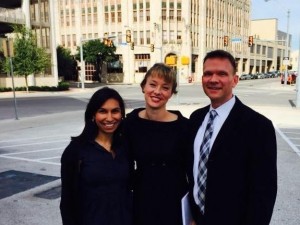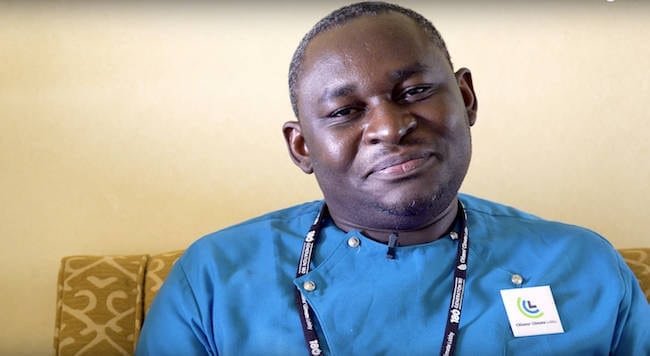
CCL Africa Regional Coordinator David Michael Terungwa
Growing CCL Africa: Determination, hope & high stakes
By Flannery Winchester
David Michael Terungwa, who goes by Mike, grew up in a rural community in Nigeria. His parents were farmers, and he loved nature as a child. When he got older, his parents sent him to study in the city of Abuja, Nigeria. “I kept looking forward to going back to the village,” Mike remembers. In Abuja, he says, “There were no opportunities for me to play in the forest, see animals, and more importantly, to swim in my favorite river.”
“About three years after, when I had the opportunity to travel back to the village, I discovered that the river was dried up,” Mike says. He didn’t understand it at first, but as he continued his schooling, he was able to connect the dots: a combination of deforestation and lack of rainfall due to climate change had drastically impacted this fixture of his childhood.
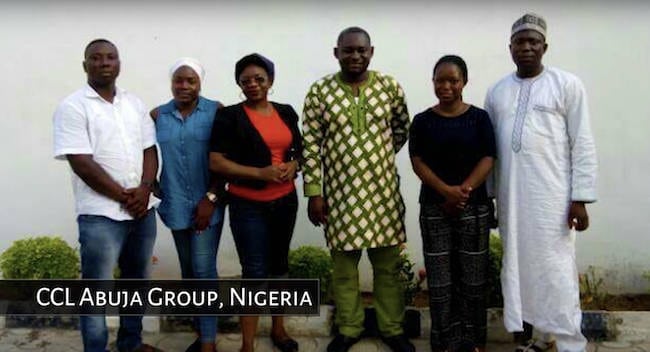
Today, Mike is CCL’s Regional Coordinator for Africa. He’s married, and he and his wife have two children: a three-year-old son and a one-year-old daughter. His typical day: “I wake up. I say my prayers—sometimes with the entire family, sometimes alone. It depends on when everybody wakes up,” he says with a smile. They live in a home that uses a generator, but this year, he hopes to relocate to a residence where he can set up solar power. Mike takes his son to school and heads to his office in Abuja. About 20 volunteers join him there every day. “I’m training them to do this work effectively,” Mike says.
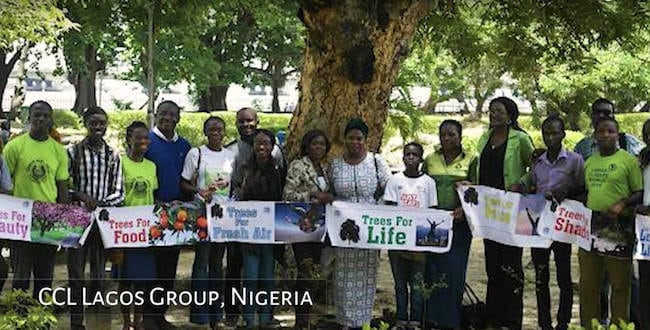
Mike and his volunteers need to be effective because this work is so urgent—Mike quickly rattles off several intensifying climate impacts already affecting Nigeria’s population of 175 million. “There are definitely already changes,” he says. “I don’t need to read from books or to look for an older person to tell me there are changes. I’m 36 years old now and have seen a lot of changes myself.” One change is increasing heat, which brings diseases along with it. Meningitis killed more than 1,000 people in Nigeria last spring, an epidemic exacerbated by a heat wave. Mike says, “We are expecting an even hotter season than last year.”
Beyond that, he adds, “On the coast, Lagos, you have sea rise and flooding. On the northern side near the Republic of Niger, there’s desert encroachment.” That fuels conflict: as grazing land is reduced, herdsmen from the northern part of Nigeria move south with their cattle, eventually competing with southern farmers for land and water. This touched Mike’s home village personally. He says, “My own people, 22 of them, were killed [in January] as a result of the crisis between herdsmen who are looking for grasses to graze their cows. Nothing else is the cause of this: It’s primarily climate change.”
In this video promoting CCL Africa’s first conference, Mike says, “We are suffering for what we did not contribute to. But we will be part of the solution.”
Tackling the problem from every angle
Depending on the day, Mike might be out of the office giving a presentation or working on some of the other environmental projects he’s a part of. One involves a grant to establish environmental clubs in Abuja schools, educating students about climate change and teaching them practical skills in energy and water conservation, compost production, and renewable energy; another project connects with local farmers in the far north of Nigeria, helping them learn to use their land wisely. “Of course, they know that there’s a lot of changes,” Mike says. “We let them know it’s because of climate change.” Personally, Mike even designed a cook stove that could be locally made and requires 70 percent less firewood to use, allowing people to cut down fewer trees for cooking fuel.
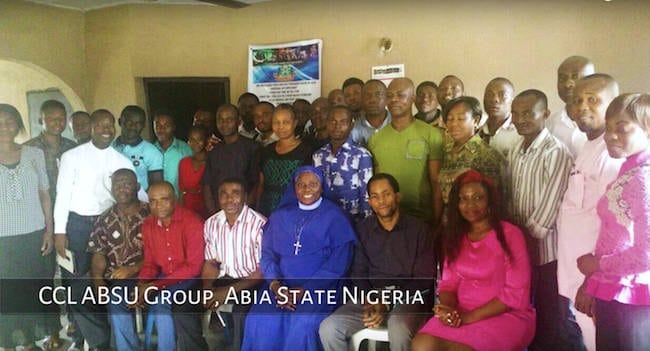
About a month after that initial connection and a phone call with CCL Global Strategy Director Joe Robertson, Mike started the CCL Abuja group. Soon after, he traveled to Nairobi and established a group there too. “Interest grew so much that I was unable to handle it,” Mike remembers. He mentions the CCL Africa Facebook group, saying, “You should see the number of comments and likes! The interest is very high.”
Reaching out & building capacity
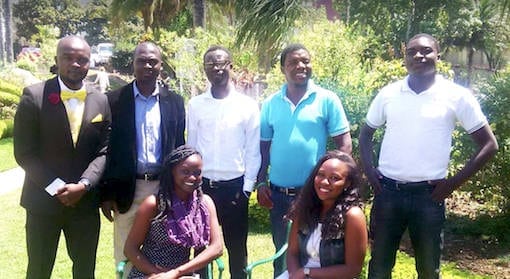
CCL Blantyre chapter in Malawi
Today, there are 20 chapters established or in progress. Most recently CCL welcomed chapters in Zambia and Madagascar aboard. So, what do they work on? Mike says, “Focus in Africa is a little bit different, but of course we are all fighting for the same cause. It’s different because our governments are not so matured yet to get to the point of Carbon Fee and Dividend.” He gives the example of the lack of complete census data in Nigeria, indicating that the administrative structures necessary to implement CF&D aren’t really in place. “At this moment, it may be very difficult to implement CF&D,” he says.
But that said, knowledge and support for carbon pricing is growing across the continent. South Africa has formally started the process to introduce a carbon tax, and Mike himself participated in last year’s African Carbon Forum, where he had many encouraging conversations. “I was surprised that people were not even aware of the Carbon Fee and Dividend strategy, but when I shared it, everybody wanted to know more.”
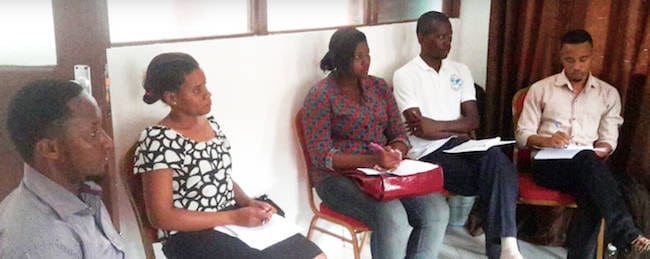
CCL Dar Es Salaam chapter in Tanzania
In the meantime, CCL groups across Africa are practicing the skills and applying the methods of CCL to other environmental challenges. “Can we start with something as simple as banning the use of plastic bags? Can we use this to build ourselves up and prepare for the launch of the Carbon Fee and Dividend strategy?” Mike wondered. “It was agreed. Our volunteers worked very, very hard with a team in Kenya, which banned the use of non-reusable plastic bags.” This showed volunteers how they can build relationships with policymakers to move the ball forward on important legislation.
“For us in Nigeria, we’re looking at coal,” Mike adds. “The government recently was talking about issuing coal mining licenses, and we found it very absurd—renewable energy is far cheaper than coal, not to talk of the environmental and the health consequences of coal extraction.” He says, “We started building partnerships with other organizations like 350.org Africa, and so far, some impact has been made with our campaign.” All this work, he underlines, is in service of building the volunteers’ capacity so that when their countries are ready for Carbon Fee and Dividend, they’re ready to pitch it to their legislators. Of CF&D, Mike says, “I know that it is the best for any country.”
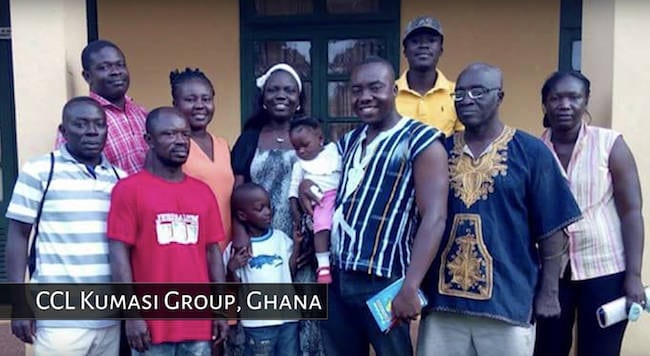
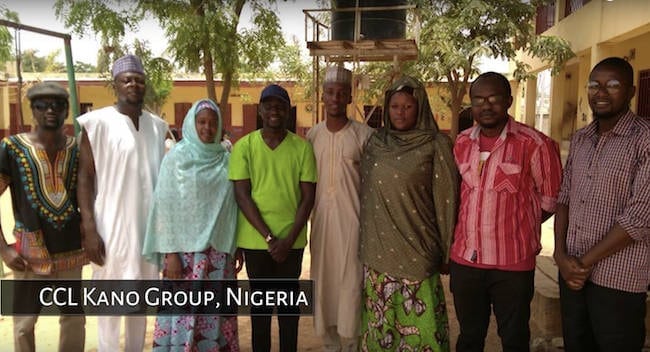
“The stakes are incredibly high for Nigeria to transition away from oil, build stable transparent institutions, secure food and water supplies, achieve sustainable development, ensure rapid-fire job creation in climate-aligned work, and end corruption,” says Joe Robertson, CCL Global Strategy Director.
“And the stakes aren’t high just for Nigerians; the world requires that Nigeria succeed,” Joe adds. “To my view, this is what Mike Terungwa and CCL Nigeria are working to facilitate, as are volunteers across Africa.”
Mike agrees. “I believe in citizens engaging themselves and engaging with politicians,” he says. “It’s much more than climate change. Community engagement works, and it’s the only thing that can save Africa.”

